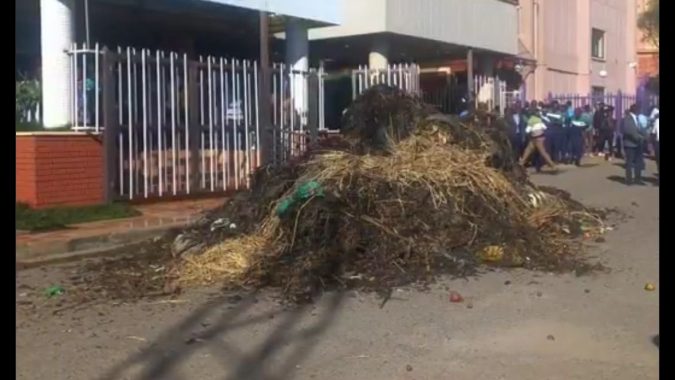Nairobi weaponised filth rather than own up to failures

Nairobi County’s recent decision to dump garbage at the doorstep of Kenya Power’s offices at Stima Plaza in retaliation for a power cut over unpaid bills is nothing short of a barbaric assault on decency, public safety, and the very essence of civilised governance.
This grotesque display of pettiness not only exposes the county’s leadership as reckless and infantile but also lays bare a chilling disregard for the health and well-being of Kenyans.
It is an act so steeped in malice and shortsightedness that it demands immediate condemnation and urgent action to prevent a descent into chaos and disease.
Let’s call this what it is: a deliberate and dangerous tantrum. Nairobi County, unable to settle its dues with Kenya Power – a utility that keeps the city’s heartbeat alive – chose not to negotiate, not to seek legal recourse, but to weaponise filth.
Truckloads of rotting garbage, buzzing with flies and reeking of decay, were dumped at Kenya Power’s premises as some twisted form of revenge.
This wasn’t a protest; it was a declaration of war on public health, a middle finger to every Kenyan who expects their leaders to act with a shred of dignity.
The implications of this act are as nauseating as the stench it unleashed. Garbage is not just an eyesore – it is a breeding ground for disease.
Cholera, typhoid, dysentery – these are not mere words in a textbook but real threats that fester in the piles of refuse Nairobi County so gleefully unloaded.
Under Kenya’s Public Health Act (Cap 242), the county government is legally obligated to safeguard the health of its citizens, not endanger it.
Section 115 explicitly mandates local authorities to maintain cleanliness and prevent conditions “likely to be injurious to health”.
By turning a corporate dispute into a biohazard, Nairobi County has not only violated this statute but spat in the face of its own mandate. This is not governance; it is sabotage.
Imagine the Kenya Power employees forced to wade through this cesspool to do their jobs – ordinary Kenyans whose only crime is showing up to work.
Imagine the residents and businesses nearby, their air now thick with the toxic fumes of decomposing waste.
This is not a petty tit-for-tat between institutions; it is a direct attack on human lives.
The county’s leaders knew this, yet they proceeded anyway, prioritising bruised egos over the public good. If that isn’t barbarism, what is?
Let’s not mince words: this stunt reeks of desperation and incompetence. Nairobi County’s unpaid bills – reportedly running into billions – reflect a deeper rot of financial mismanagement.
Rather than own up to their failures, they’ve chosen to deflect blame with a theatrical display of trash.
It’s the kind of move you’d expect from a petty thug, not a government tasked with running a capital city. And yet, here we are, watching a county administration reduce itself to the level of a street brawl, dragging the rest of us down with it.
The health risks alone should have stopped this madness in its tracks. The Public Health Act isn’t a suggestion – it’s a binding framework to protect Kenyans from exactly this kind of recklessness.
Section 118 empowers authorities to abate nuisances like garbage dumping, yet Nairobi County has become the nuisance itself.
The irony is suffocating: a government that can’t pay its bills has now gifted us a potential epidemic, all because it couldn’t swallow its pride.
Disease doesn’t care about unpaid invoices, and neither should the law.
The county’s leadership must be held accountable, not just for the stench, but for the lives they’ve put at risk.
This isn’t just about Kenya Power or some bureaucratic spat—it’s about what Nairobi County’s actions say about us as a society. Are we a people who solve problems with reason, or do we fling garbage at each other like animals?
The world is watching, and this spectacle shames us all. Tourists don’t come to a city that smells like a landfill, and investors don’t pour money into a place where disputes are settled with trash heaps.
Nairobi, once dubbed the “Green City in the Sun”, risks becoming a laughingstock – a cautionary tale of how low leadership can sink.
Enough is enough. The national government must step in, not just to clean up this mess but to punish those responsible.
The county officials who greenlit this abomination should face the full weight of the law—fines, prosecutions, anything to ensure this never happens again.
— The writer is a Communication Consultant












